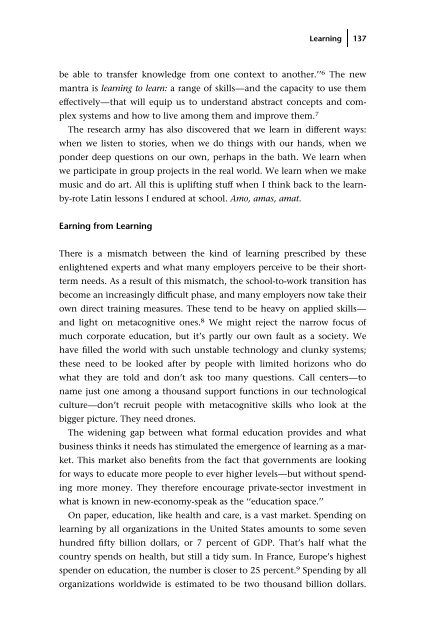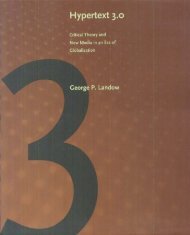- Page 1 and 2:
IN THE BUBBLE DESIGNING IN A COMPLE
- Page 4 and 5:
In the Bubble Designing in a Comple
- Page 6:
Contents Acknowledgments vii Introd
- Page 9 and 10:
viii Acknowledgments many journalis
- Page 12 and 13:
Introduction ‘‘In the bubble’
- Page 14 and 15:
smarter—and usually cheaper—pro
- Page 16 and 17:
Introduction 5 innovation—results
- Page 18 and 19:
Introduction 7 ply to all kinds of
- Page 20 and 21:
1 Lightness I am driving along the
- Page 22 and 23:
Lightness 11 there are a lot of the
- Page 24 and 25:
Lightness 13 areas of productive la
- Page 26 and 27:
into product development have resul
- Page 28 and 29:
necessities—food, clothing, shelt
- Page 30 and 31:
own weight to manufacture such an o
- Page 32 and 33:
BodyMedia took a communication desi
- Page 34 and 35:
Lightness 23 for feedback and sense
- Page 36 and 37:
Lightness 25 and writer Antoine Sai
- Page 38:
Lightness 27 ‘‘Lightness,’’
- Page 41 and 42:
30 Chapter 2 Questioning speed and
- Page 43 and 44:
32 Chapter 2 burn as much fossil fu
- Page 45 and 46:
34 Chapter 2 standard of living of
- Page 47 and 48:
36 Chapter 2 also warned that the a
- Page 49 and 50:
38 Chapter 2 picture. Speed, in thi
- Page 51 and 52:
40 Chapter 2 To fill this gap, howe
- Page 53 and 54:
42 Chapter 2 quitting work, or goin
- Page 55 and 56:
44 Chapter 2 measures, such as redu
- Page 57 and 58:
46 Chapter 2 water, and nutrients i
- Page 59 and 60:
48 Chapter 2 Service has identified
- Page 61 and 62:
50 Chapter 2 the right tempo with t
- Page 63 and 64:
52 Chapter 3 Why Mobility Matters M
- Page 65 and 66:
54 Chapter 3 ‘‘Time is money, w
- Page 67 and 68:
56 Chapter 3 failure. The average c
- Page 69 and 70:
58 Chapter 3 journey is by air on A
- Page 71 and 72:
60 Chapter 3 of mobility is unsusta
- Page 73 and 74:
62 Chapter 3 room that blends physi
- Page 75 and 76:
64 Chapter 3 were inspired by the s
- Page 77 and 78:
66 Chapter 3 Digital playgrounds ar
- Page 79 and 80:
68 Chapter 3 puter world, in which
- Page 81 and 82:
70 Chapter 3 that matters, accordin
- Page 83 and 84:
72 Chapter 3 such as walking, bikin
- Page 85 and 86:
74 Chapter 4 four or five thousand
- Page 87 and 88:
76 Chapter 4 a city for passive par
- Page 89 and 90:
78 Chapter 4 creative. The survey i
- Page 91 and 92:
80 Chapter 4 Futures models the geo
- Page 93 and 94:
82 Chapter 4 The Regionmaker as one
- Page 95 and 96:
84 Chapter 4 Handsets allow users t
- Page 97 and 98: 86 Chapter 4 Relationships mediated
- Page 99 and 100: 88 Chapter 4 centers—but left mos
- Page 101 and 102: 90 Chapter 4 been able to reduce th
- Page 103 and 104: 92 Chapter 4 chapter, much of the w
- Page 105 and 106: 94 Chapter 4 An Icelandic designer,
- Page 107 and 108: 96 Chapter 4 In this chapter, I hav
- Page 109 and 110: 98 Chapter 5 we made was to move tw
- Page 111 and 112: 100 Chapter 5 complex interactions,
- Page 113 and 114: 102 Chapter 5 Planning a big transp
- Page 115 and 116: 104 Chapter 5 says Winnicott, ‘
- Page 117 and 118: 106 Chapter 5 by architects or syst
- Page 119 and 120: 108 Chapter 5 the point. The fundam
- Page 121 and 122: 110 Chapter 5 We were seen rather p
- Page 124 and 125: 6 Conviviality Whole nations now wo
- Page 126 and 127: Wellware Conviviality 115 Confronte
- Page 128 and 129: More and more people are convinced
- Page 130 and 131: Conviviality 119 peer production of
- Page 132 and 133: One online user of a support servic
- Page 134 and 135: meet the needs on their behalf.’
- Page 136 and 137: perous regions make similar points:
- Page 138 and 139: Conviviality 127 m Redefining work
- Page 140 and 141: Once a population expands beyond a
- Page 142 and 143: Connected Communities Conviviality
- Page 144 and 145: Throughout history, human beings ha
- Page 146 and 147: 7 Learning Learning as a Design Iss
- Page 150 and 151: institutions to join them; these in
- Page 152 and 153: in e-learning continues at signific
- Page 154 and 155: some kind of Learning Central, that
- Page 156 and 157: launched a website accessible from
- Page 158 and 159: Learning 147 geology, viticulture,
- Page 160 and 161: The most interesting phase of a pro
- Page 162 and 163: degree and quality of reflection de
- Page 164 and 165: Learning 153 rapid, mass, large-sca
- Page 166 and 167: Learning 155 with a learner. What p
- Page 168 and 169: Learning 157 standing. Banks, oil c
- Page 170: Learning 159 how learners, teachers
- Page 173 and 174: 162 Chapter 8 system taking place o
- Page 175 and 176: 164 Chapter 8 of paper, most of it
- Page 177 and 178: 166 Chapter 8 spills,’’ said Li
- Page 179 and 180: 168 Chapter 8 can attract attention
- Page 181 and 182: 170 Chapter 8 Criticism of the glob
- Page 183 and 184: 172 Chapter 8 the central question
- Page 185 and 186: 174 Chapter 8 the human colon. 39 (
- Page 187 and 188: 176 Chapter 8 designed a new set of
- Page 189 and 190: 178 Chapter 8 come into bloom at di
- Page 191 and 192: 180 Chapter 8 make us switch off th
- Page 193 and 194: 182 Chapter 8 Fluxus—a movement o
- Page 195 and 196: 184 Chapter 8 us new processes of c
- Page 197 and 198: 186 Chapter 9 just a dumb bird. It
- Page 199 and 200:
188 Chapter 9 of an abalone is twic
- Page 201 and 202:
190 Chapter 9 existing needs, desig
- Page 203 and 204:
192 Chapter 9 tend to vary through
- Page 205 and 206:
194 Chapter 9 Julian Vincent sees c
- Page 207 and 208:
196 Chapter 9 Structural self-repai
- Page 209 and 210:
198 Chapter 9 error works when mill
- Page 211 and 212:
200 Chapter 9 Embedded—but Not As
- Page 213 and 214:
202 Chapter 9 thanks to advances in
- Page 215 and 216:
204 Chapter 9 AmI? The mission for
- Page 217 and 218:
206 Chapter 9 Pervasive computing t
- Page 219 and 220:
208 Chapter 9 Zeroing Out When an I
- Page 222 and 223:
10 Flow Four grand pianos, their li
- Page 224 and 225:
complex world, ‘‘its ultimate o
- Page 226 and 227:
Flow 215 body,’’ said the sage;
- Page 228 and 229:
and Amsterdam. Places whose lifeblo
- Page 230 and 231:
Flow 219 enhance the kinds of daily
- Page 232 and 233:
Flow 221 public project ever, creat
- Page 234 and 235:
Flow 223 Our world is fast being su
- Page 236 and 237:
same thing as a cake.’’ 38 Desi
- Page 238 and 239:
Notes Introduction 1. Statistic quo
- Page 240 and 241:
Notes to Pages 10-11 229 warming du
- Page 242 and 243:
and outputs of industrial processes
- Page 244 and 245:
tainable Europe Research Institute
- Page 246 and 247:
2 Speed 1. Bruce Chatwin, The Songl
- Page 248 and 249:
33. Vivek Ranadive, The Power of No
- Page 250 and 251:
needed again. The elimination of po
- Page 252 and 253:
in the online discussion forum Worl
- Page 254 and 255:
freely, gain access, communicate, t
- Page 256 and 257:
29, 2003, available at http://www.f
- Page 258 and 259:
Notes to Pages 80-82 247 16. Local
- Page 260 and 261:
37. Townsend has since started a bl
- Page 262 and 263:
7. Henry Plummer, ‘‘The Poetics
- Page 264 and 265:
systems in 191 member states, it fo
- Page 266 and 267:
Academic Health Centers (final repo
- Page 268 and 269:
39. Ann Oakley, The Sociology of Ho
- Page 270 and 271:
7 Learning 1. Ivan Illich, Deschool
- Page 272 and 273:
23. Ibid. 24. Charles Hampden-Turne
- Page 274 and 275:
43. Thomas A. Stewart, ‘‘What I
- Page 276 and 277:
Notes to Pages 165-167 265 Homeland
- Page 278 and 279:
34. Terry Winograd and Fernando Flo
- Page 280 and 281:
55. Joseph Nathaniel Kaye. ‘‘Sy
- Page 282 and 283:
Architecture Foundation (www.smarta
- Page 284 and 285:
west coast railway line thought the
- Page 286 and 287:
44. A case study about Oticon is in
- Page 288 and 289:
Notes to Pages 204-205 277 59. Geor
- Page 290 and 291:
2. Manuel Castells, The Rise of Net
- Page 292:
1998); Michiel Schwarz, Holland sch
- Page 295 and 296:
284 What to Read Next Benyus, Janin
- Page 297 and 298:
286 What to Read Next Schlosser, Er
- Page 299 and 300:
288 Bibliography Boutinet, Jean-Pie
- Page 301 and 302:
290 Bibliography Florida, Richard.
- Page 303 and 304:
292 Bibliography Laurel, Brenda. Co
- Page 305 and 306:
294 Bibliography Schor, Juliet B. T
- Page 308 and 309:
Index 2001: A Space Odyssey, 172 3-
- Page 310 and 311:
British Airports Authority, 233n30
- Page 312 and 313:
speed design and, 43-44 time scales
- Page 314 and 315:
dashboards and, 169 German study of
- Page 316 and 317:
control and, 225-226 designing spac
- Page 318 and 319:
job quality and, 124-125 kairologic
- Page 320 and 321:
cost and, 90 digital graffiti and,
- Page 322 and 323:
McDonald’s, 92 McDonough, William
- Page 324 and 325:
Nemawashi, 43 Netherlands Design In
- Page 326 and 327:
RhineRuhrCity project, 82 Rhythm, 4
- Page 328 and 329:
Southwest Airlines, 56 Soya Choupal
- Page 330 and 331:
speed and, 30, 36 ticket purchasing
- Page 332:
Winkler, Nicolaus, 49 Winnicott, Da





